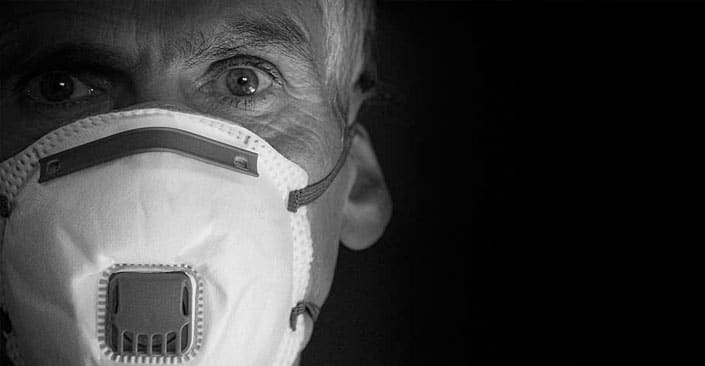

Every one of us will have some really hard days during this pandemic.
You know why?
We are grieving.
We All Are Grieving
And no loss is too small: from deaths to ill health impacts, to lost or changed jobs, to major life events cancelled or postponed (graduations, parties, celebrations, weddings, ceremonies), to the forced changes in our routines and the loss of physical presence of those we care about.
And then there’s the guilt over our grief. Or, worse, being shamed over our grief. “How can you talk about missing your nail appointments or not having alone time when people are dying?” But we can and we should talk about our grief, whatever that looks like. And know this: no loss is too small to grieve.
Catastrophic Behaviors
There is also a lot of catastrophic thinking happening right now. We’re reacting from the fear part of the brain — the amygdala — and when that part of the brain is on high alert, as it is right now for many of us, everything is seen as a catastrophe. Our prefrontal cortex should be in charge, which regulates emotions and good-decision-making skills, but when we’re operating from fear with our high alert amygdala in charge, we can’t regulate our emotions or use good decision-making choices. Instead, we buy as much toilet paper as we can and view the world through a catastrophic lens.
It Is All Okay
Here is the thing: any reaction right now is OK. Whether you are actively grieving or thinking catastrophically (or both combined and double downed), and whether that shows up as tears or rage, is OK. Don’t spend time judging your reaction (or comparing it to another’s) because it isn’t helpful, nor is it effective in changing how you feel.
And here is another thing: if you try to shame it away (or allow others to), or pack it away, or numb it away, it will only get worse for you emotionally and physically. Your mind and body will literally get sick from the suppression. It will put even more stress on an already stressful situation, and stress makes the immune system less efficient.
What Stress Does to Us
Not only does stress weaken the immune system, it affects critical behaviors; we don’t sleep as well, we make poor eating choices, we don’t hydrate as we should, and/or we turn to alcohol or drugs as coping tools. Stress also releases neurohormones that impact our brain’s performance. Stress causes dis-ease (and disease) in the body.
So What Can We Do?
1. Be careful how much pain you take in. Compassion fatigue is real. Holding pain for others is a gift, but it can also overtake us, and then we are left immobile and emotionally drained. Minimize the pain and information you are taking in right now. Remember that saying about airplane oxygen masks? You have to put your own mask on before you can take care of others. Again, this means you can’t afford to take in too much pain right now. And one source of pain is the news, so consider minimizing the information you take in.
2. Have a routine. Even if it looks so much different now than two weeks ago, and even if it isn’t what your ideal routine looks like, routine is important. Pick 2-3 things that will be an absolute for you and your family at this time. Routine creates a sense of safety and well-being, for you and your family.
3. Stay in touch with loved ones. Consider one person a day you can connect with. You could have an impromptu video chat with family around the world, a virtual happy hour with loved ones, a video double date with your spouse and friends, or talk with a neighbor a driveway away.
4. Recognize what is in your control and what is not, and then do some acceptance work for what is not in your control.
5. Spend some time considering that there will be miracles happening from all of this: critical lessons from losses (we learn from everything that happens to us) and all the healing that is going on (the planet and relationships around the world, politicians working together, world leaders helping each other). There is so much more good than bad; trust me on this.
6. Recognize that it is not your job to convince anyone of anything. Regardless of how you are spending this quarantined time, it is your choice and you don’t need to convince anyone why you are choosing what you are. Your only job is to communicate it as needed. (For example, if you are not accepting home deliveries, communicate that to the necessary individuals/companies, but don’t feel like you have to spend time convincing people why.) We have only so much precious energy to spend. Don’t waste it worrying about the judgment of others or judging your own choices.
7. However you handle this time is up to you. This is the perfect time to do all the things you “haven’t had time for,” but maybe that’s not what you need right now. Maybe what you need is rest. Or to cry. Don’t let anyone’s words (including my own) make you feel ashamed because you are not “hustling your heart out” right now.
8. Lean in and let it out. Cry it out. Scream it out. Write it out. Talk it out. Lean in and get it out. Take it to someone you trust and share it. Maybe even try recording yourself talking about how you feel and then listen to it. (This creates ownership of being there for yourself.) Don’t bottle it up or numb it out. Remember what suppression does? Let’s not do that.
9. Consider cleaning out your spaces. Organizing and minimizing can give you a sense of control and also free up anxious energy stored around you. Maybe take one space at a time.One drawer today, one closet tomorrow.
10. Rest. I know this sounds easier said than done, but rest is critical for the mind and body. Create a routine around bedtime and stick to it. Mine looks like this:
- No eating or drinking (other than my bedtime tea) 2-3 hours before Iaying down to sleep
- No TV or electronics at least 1 hour prior to laying down to sleep
- I drink a wonderful herbal tea prior to laying down to sleep
- I read a book for 20-30 minutes prior to turning off the soft bedside light
- Sometimes I might stretch or listen to a mediation instead of reading
11. For some, the idea of loneliness can be a trigger. Being quarantined can feel a lot like loneliness (yes, even if your family is home with you). Consider that loneliness is a feeling of isolation or without company. Solitude, on the other hand, is about being the best company for yourself. Sometimes it is merely changing the words or the perspective. In solitude, you can decide what you need to be the best you in that moment. Is it a cup of tea? Or reading? Or painting? Or creating? Is it sharing funny memes or watching inspiring videos?
12. Practicing mindfulness can bring you out of anxious thinking. Anxiety is always past or future focused, and mindfulness brings you to the present time, thus not allowing anxiety to take over entirely. Consider practicing mindfulness each time you wash your hands (especially since that’s a particularly popular activity lately). Each time you wash your hands, think about 5, 4, 3, 2, 1:
- 5 things you can see
- 4 things you can touch
- 3 things you can hear
- 2 things you can smell
- 1 thing you can taste
13. Lastly, consider doing something for someone else. How can you bring someone else joy? (Bonus: you will indirectly bring yourself joy too!)
What are some things that are helping you experience peace and relief during this otherwise incredibly stressful time?
Copyright 2026 Center for Nutrition Studies. All rights reserved.
Deepen Your Knowledge With Our
Plant-Based Nutrition
Certificate
Plant-Based Nutrition Certificate
- 23,000+ students
- 100% online, learn at your own pace
- No prerequisites
- Continuing education credits











